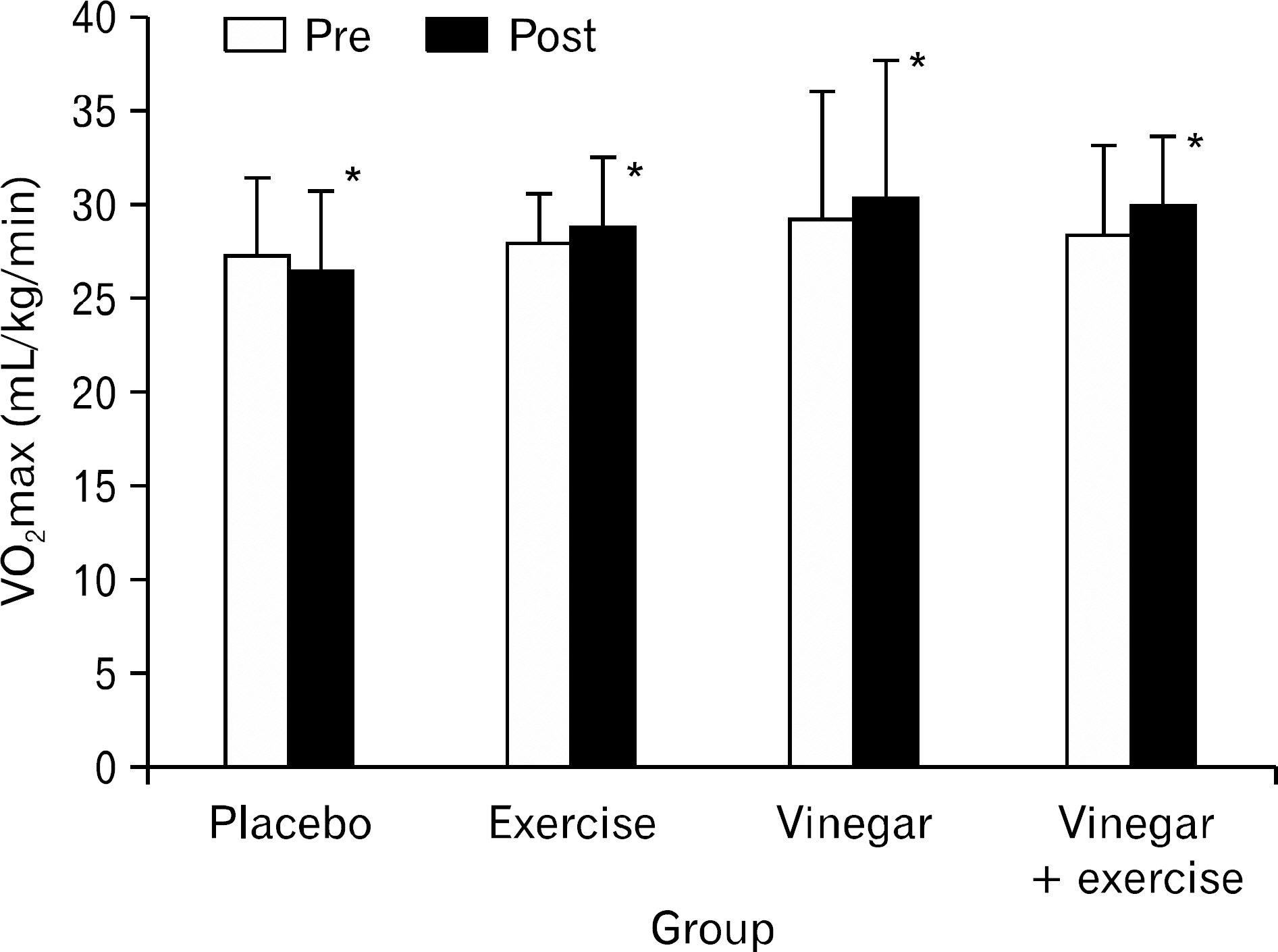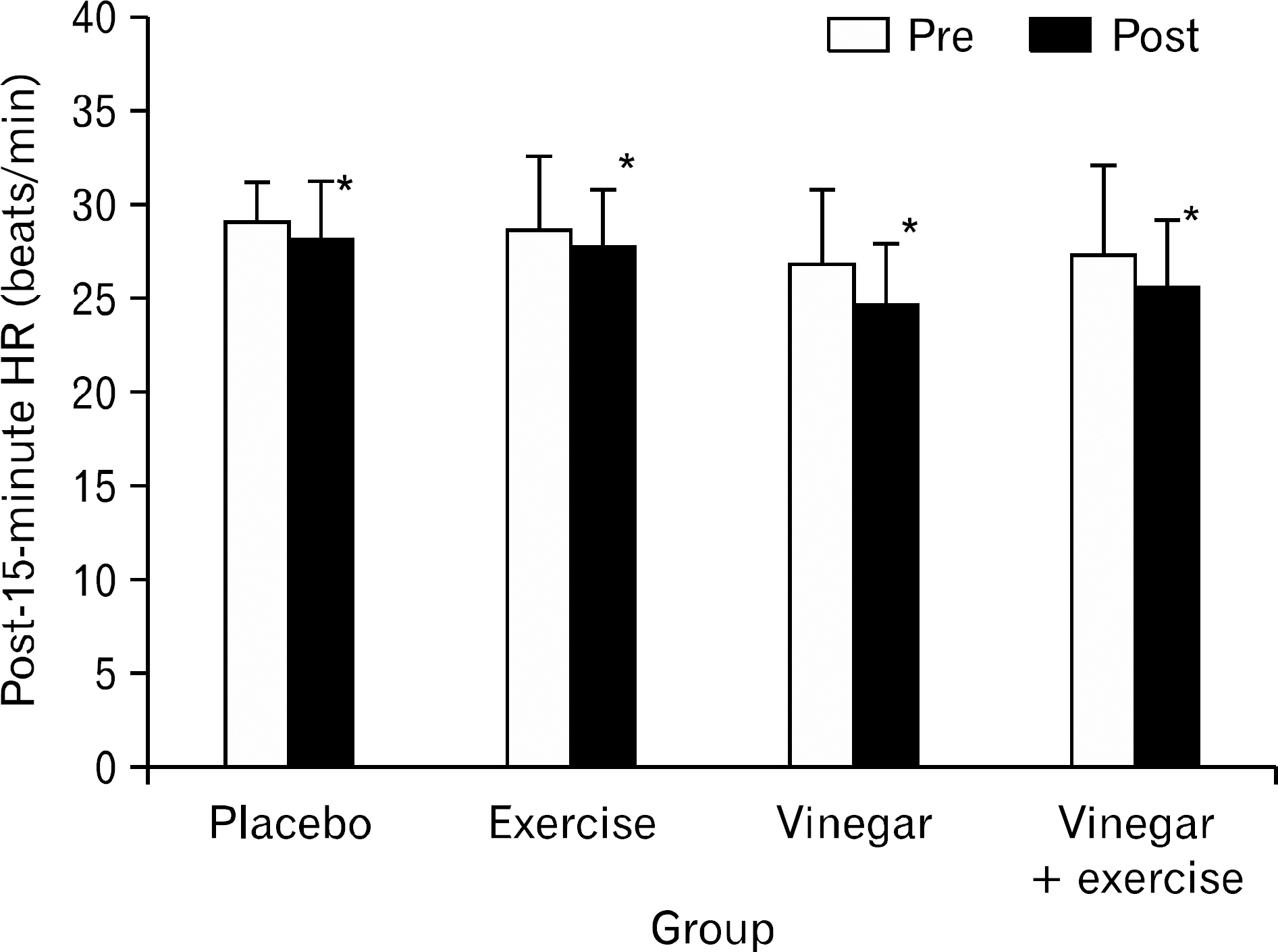Korean J Sports Med.
2018 Sep;36(3):126-134. 10.5763/kjsm.2018.36.3.126.
Effects of Aerobic Exercise Training and Natural Fermented Vinegar on Body Composition and Cardiopulmonary Function in Middle Aged Women
- Affiliations
-
- 1Department of Physical Education, College of Physical Education, Keimyung University, Daegu,Korea. kjk744@kmu.ac.kr
- 2Department of Food Science and Technology, College of Natural Science, Keimyung University, Daegu, Korea.
- 3KMF Co., Ltd., Daegu, Korea.
- KMID: 2429210
- DOI: http://doi.org/10.5763/kjsm.2018.36.3.126
Abstract
- PURPOSE
The aim of this study was to examine the effects of long-term endurance exercise and natural fermented vinegar on body composition and cardiopulmonary function of 50-aged postmenopausal women.
METHODS
Subjects were divided into four groups (sedentary group, aerobic exercise group, natural fermented vinegar group, and aerobic exercise plus natural fermented vinegar group) to perform natural fermented vinegar intake or aerobic exercise for 8 weeks. Body weight, body composition, cardio-pulmonary function test, and blood concentration of glucose, lipid profiles, aspartate aminotransferase, and alanine aminotransferase were measured.
RESULTS
The results showed that natural fermented vinegar or aerobic exercise training for 8 weeks no significantly improved body weight control and body composition. However, natural fermented vinegar plus aerobic exercise training for 8 weeks significantly improved cardiopulmonary function.
CONCLUSION
These results suggest that natural fermented vinegar plus aerobic exercise training has a significant effect on anti-fatigue.
Keyword
MeSH Terms
Figure
Reference
-
1. Crino M, Sacks G, Vandevijvere S, Swinburn B, Neal B. The Influence on population weight gain and obesity of the macronutrient composition and energy density of the food supply. Curr Obes Rep. 2015; 4:1–10.
Article2. Wong C, Marwick TH. Obesity cardiomyopathy: pathogenesis and pathophysiology. Nat Clin Pract Cardiovasc Med. 2007; 4:436–43.
Article3. Cavalera M, Wang J, Frangogiannis NG. Obesity, metabolic dysfunction, and cardiac fibrosis: pathophysiological pathways, molecular mechanisms, and therapeutic opportunities. Transl Res. 2014; 164:323–35.
Article4. Wang Z, Nakayama T. Inflammation, a link between obesity and cardiovascular disease. Mediators Inflamm. 2010; 2010:535918.
Article5. Westphal SA. Obesity, abdominal obesity, and insulin resistance. Clin Cornerstone. 2008; 9:23–9.
Article6. Zaldivar F, McMurray RG, Nemet D, Galassetti P, Mills PJ, Cooper DM. Body fat and circulating leukocytes in children. Int J Obes (Lond). 2006; 30:906–11.
Article7. Uysal O, Arikan E, Cakir B. Plasma total homocysteine level and its association with carotid intima-media thickness in obesity. J Endocrinol Invest. 2005; 28:928–34.
Article8. Razavi A, Baghshani MR, Rahsepar AA, et al. Association between C-reactive protein, pro-oxidant-antioxidant balance and traditional cardiovascular risk factors in an Iranian population. Ann Clin Biochem. 2013; 50(Pt 2):115–21.
Article9. Joseph SV, Edirisinghe I, Burton-Freeman BM. Fruit polyphenols: a review of anti-inflammatory effects in humans. Crit Rev Food Sci Nutr. 2016; 56:419–44.
Article10. Bounihi A, Bitam A, Bouazza A, Yargui L, Koceir EA. Fruit vinegars attenuate cardiac injury via anti-inflammatory and anti-adiposity actions in high-fat diet-induced obese rats. Pharm Biol. 2017; 55:43–52.
Article11. Setorki M, Nazari B, Asgary S, Azadbakht L, Rafieian-Kopaei M. Anti atherosclerotic effects of verjuice on hypocholesterolemic rabbits. Afr J Pharm Pharmacol. 2011; 5:1038–45.12. Lee JH, Cho HD, Jeong JH, et al. New vinegar produced by tomato suppresses adipocyte differentiation and fat accumulation in 3T3-L1 cells and obese rat model. Food Chem. 2013; 141:3241–9.
Article13. Bouazza A, Bitam A, Amiali M, Bounihi A, Yargui L, Koceir EA. Effect of fruit vinegars on liver damage and oxidative stress in high-fat-fed rats. Pharm Biol. 2016; 54:260–5.
Article14. Park S, Park S, Lee M, Ahn H. Validation of prediction equations for VO2max using bruce protocol. Korean J Meas Eval Physic Educ Sport Sci. 2014; 16:41–50.15. Friedewald WT, Levy RI, Fredrickson DS. Estimation of the concentration of low-density lipoprotein cholesterol in plasma, without use of the preparative ultracentrifuge. Clin Chem. 1972; 18:499–502.
Article16. Gleeson M, Bishop NC, Stensel DJ, Lindley MR, Mastana SS, Nimmo MA. The anti-inflammatory effects of exercise: mechanisms and implications for the prevention and treatment of disease. Nat Rev Immunol. 2011; 11:607–15.
Article17. Mora S, Cook N, Buring JE, Ridker PM, Lee IM. Physical activity and reduced risk of cardiovascular events: potential mediating mechanisms. Circulation. 2007; 116:2110–8.18. Fogelholm M. Physical activity, fitness and fatness: relations to mortality, morbidity and disease risk factors. A systematic review. Obes Rev. 2010; 11:202–21.
Article19. Mohamad NE, Yeap SK, Ky H, et al. Dietary coconut water vinegar for improvement of obesity-associated inflammation in high-fat-diet-treated mice. Food Nutr Res. 2017; 61:1368322.
Article20. Cheong SR, Baek SY, Yeo SH, Lee CH, Park YK. 2 Month of 1% Rubus coreanus vinegar drink reduces body weight and adipocyte size in dietary induced obesity rats. FASEB J. 2014; 28(1 Suppl):LB361.
Article21. de Dios Lozano J, Juarez-Flores BI, Pinos-Rodriguez JM, Aguirre-Rivera JR, Alvarez-Fuentes G. Supplementary effects of vinegar on body weight and blood metabolites in healthy rats fed conventional diets and obese rats fed high-caloric diets. J Med Plants Res. 2012; 6:4135–41.
Article22. Kim K, Jung SR, Ahn NY, et al. Effects of longterm endurance exercise and salvia miltiorrhiza vinegar on body composition and insulin resistance in high fat diet-induced obese rats. Korean J Food Preserv. 2017; 24:666–72.
Article23. Hamer M, Steptoe A. Prospective study of physical fitness, adiposity, and inflammatory markers in healthy middle-aged men and women. Am J Clin Nutr. 2009; 89:85–9.
Article24. Friedenreich CM, Neilson HK, Woolcott CG, et al. Mediators and moderators of the effects of a year-long exercise intervention on endogenous sex hormones in postmenopausal women. Cancer Causes Control. 2011; 22:1365–73.
Article25. Kim KJ, Ahn NY. Comparisons of changes blood CRP concentration and HOMA-IR were followed by %fat or cardiorespiratory function change after aerobic and resistance exercise in middle-age women. Exerc Sci. 2009; 18:317–28.26. Shin JY, Kang JR, Shin JH, et al. Effects of Seomaeyakssuk (Artemisia argyi H.) vinegar on lipid metabolism in rats fed a high-fat and high-cholesterol diet. J Korean Soc Food Sci Nutr. 2017; 46:779–89.27. Yoon CS, Kim JJ, Park DR, Ra SG, Ha TG. The effect of 6weeks training and vinegar drinks(SCFA) supplement on blood immune function response during exercise and recovery period in swimmer. Korea J Sports Sci. 2015; 24:1205–15.28. Chapados N, Collin P, Imbeault P, Corriveau P, Lavoie JM. Exercise training decreases in vitro stimulated lipolysis in a visceral (mesenteric) but not in the retroperitoneal fat depot of high-fat-fed rats. Br J Nutr. 2008; 100:518–25.
Article29. Beh BK, Mohamad NE, Yeap SK, et al. Anti-obesity and anti-inflammatory effects of synthetic acetic acid vinegar and Nipa vinegar on high-fat-diet-induced obese mice. Sci Rep. 2017; 7:6664.
Article
- Full Text Links
- Actions
-
Cited
- CITED
-
- Close
- Share
- Similar articles
-
- Effect of 8 week's aerobic dance training on the body composition, cardiopulmonary function and blood cholesterol concentration in young women
- The Effects of Aerobic Exercise on Hormones, Blood Lipids and Body Composition in Middle-Aged Obese Women according to 3-Adrenergic Receptor Gene Polymorphisms
- The Effect of Detraining on Lipoprotein and Body Composition after 8 Week Calorie Restriction and Different Level of Aerobic Exercise among Obese Middle-aged Women
- Effects of Aerobic Exercise Program for Obese Elderly Women
- Twelve Weeks of Aerobic Exercise at the LactateThreshold Improves Autonomic Nervous SystemFunction, Body Composition, and Aerobic Performancein Women with Obesity




